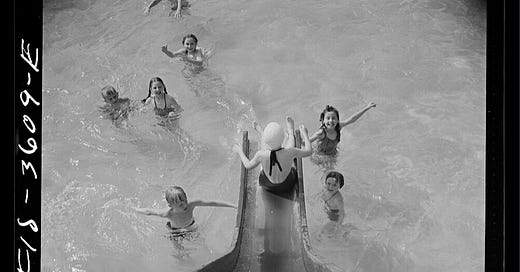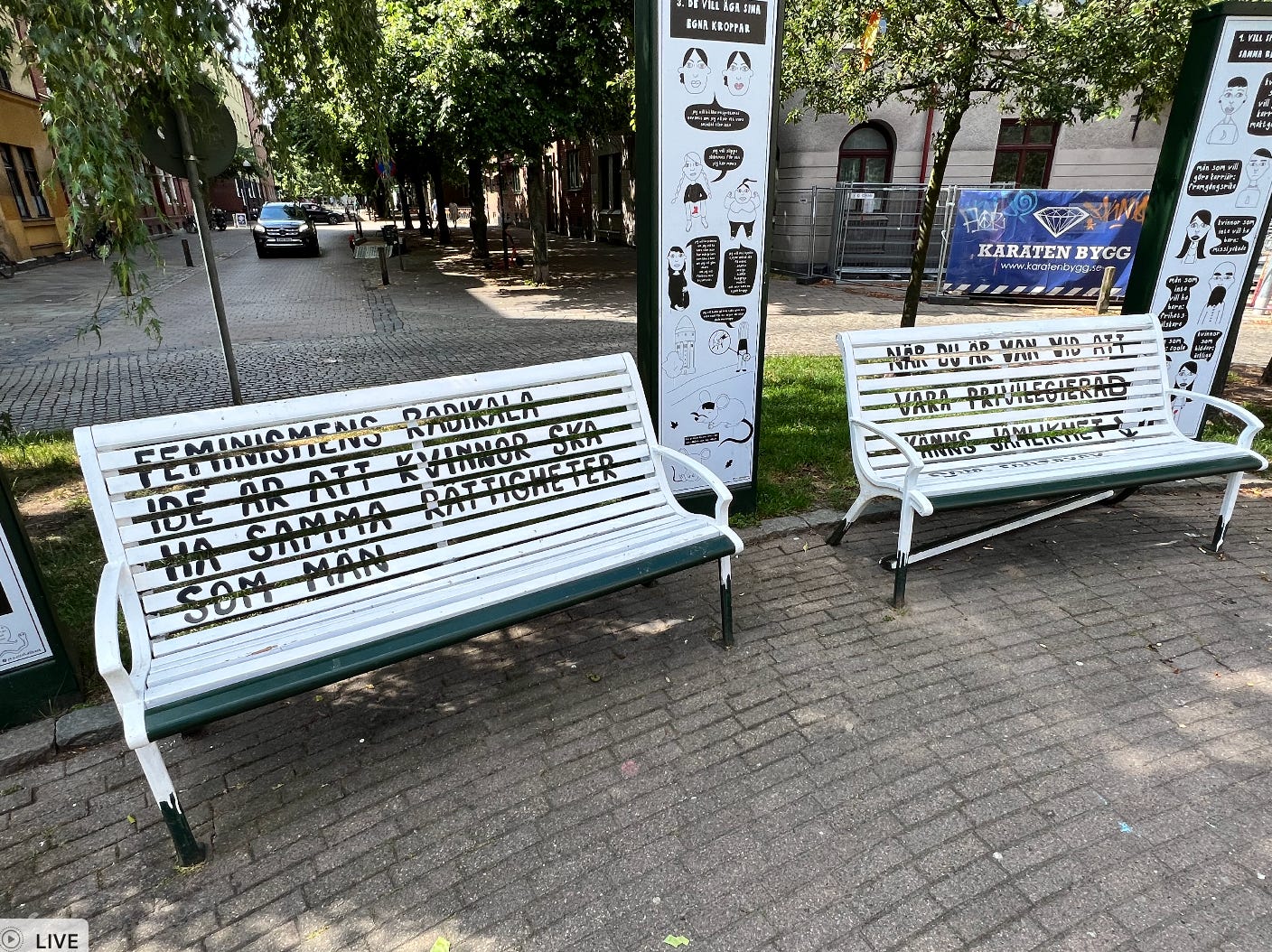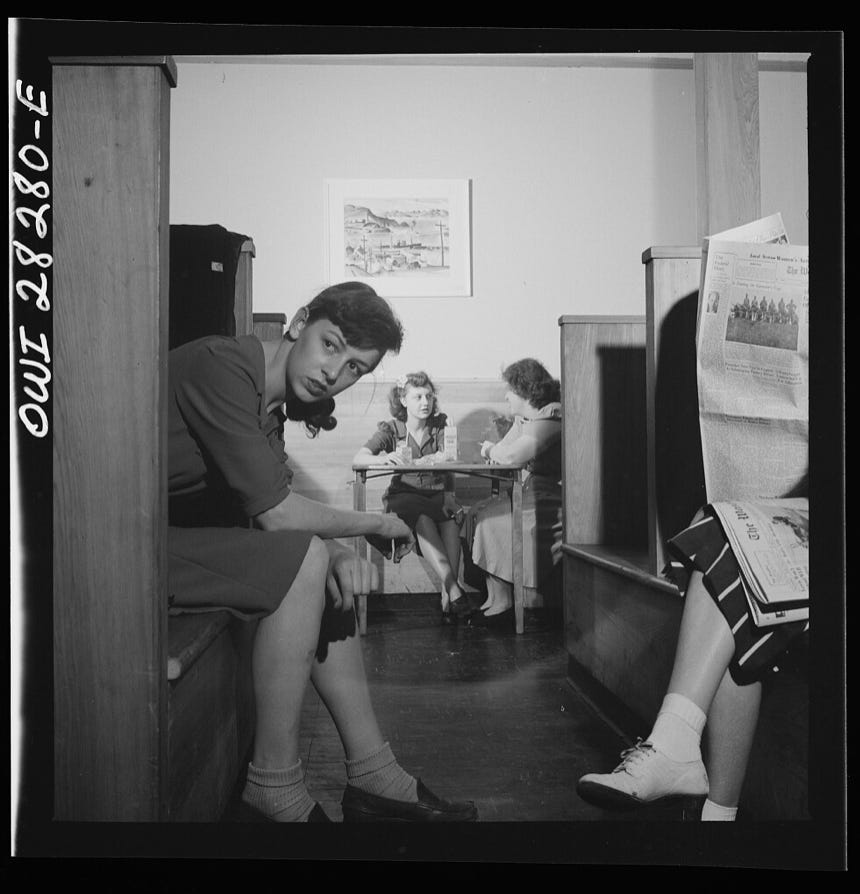The greatest saints in the world
In praise of the people who make the long, hard work of building a better world more bearable
The White Pages is both a reader-supported publication and one part of my broader work with The Barnraisers Project. If you’re in a position to support our efforts, it would mean the world to me. I also think you’ll enjoy being a part of our community. As you’ll see below, our first ever subscriber-only discussion was a delight. Regardless of whether you can support, it’s good to have you here. Thanks for reading, thanks for writing me back, thanks for sharing and thanks for pitching in.
I am in Sweden right now. It’s a funny place to be over the past week if you’re a central casting left-leaning White American1. My family flew here on Sunday, a few days after the U.S. Supreme Court declared that it had opinions on abortion (their choice, not yours) and guns (more) but a few days before it offered opinions about pollution (it’s fine) and tribal sovereignty (it’s not). Apparently, there are promise of future opinions, such as about whether state legislatures will be allowed to put a pause on representative democracy whenever they feel like it. It’s notably bad and scary, which is saying a lot because we are nothing at this point if not extremely skilled processors of bad and scary news.
Sweden, of course, is the exact kind of country that, upon first glance, always feels like a left-leaning White American fever dream. On weeks like this, though? You feel like you’re being constantly pranked! Who are all these decidedly-not-overworked middle class people on bicycles? Surely all of these fathers pushing prams aren’t on paternity leave? Where are the assault rifles? Where is everybody storing their medical and educational debt? Are they hidden somewhere behind this feminist public art installation in the middle of a traffic calming roundabout?
I should probably add the obligatory Sweden Isn’t Perfect caveat here. And it’s true— it isn’t! It is a country that is actively struggling to become a true people’s home for folks who aren’t blond-haired ethnic Swedes. Its own far-right xenophobic political party is squeezing its way closer and closer to mainstream acceptance. Its Covid response was uncharacteristically flawed. Its still-enviable government safety net has more holes and frayed edges than it once did.
But on weeks like this, Sweden isn’t an actual complicated, human place. Neither is America. They are simple, emotional stories. One is a social democratic paradise. One is, depending on who you ask, either already fully fascistic or on its way there. Our emotional experience of a place is never the true, actual reality, but that doesn’t mean those feelings don’t matter.
There is no single right way to emotionally experience these moments of political and social quickening. I’m not out here to shame anybody who is more fatalistic, who feels the call to ring alarm bells, to shout the direness of this moment from the rooftops. That’s an important part of social change. Alarm bells don’t ring themselves. Blessed be the ringers.
The dilemma of constantly ringing alarm bells, though, is that it isn’t always clear what to do after you hear them. Feel constantly angry and vaguely stressed out? Donate money in hurried, panicky spurts? Protest? Riot? Curse every fundraising email you get from a Democratic politician? OK! OK! OK! And then what?
I had an unexpectedly lovely experience this past week, truth be told, one that gave me more insight into “and then what” than I was expecting. Since I was in Sweden and since I was of course feeling a metric ton of White liberal American wanderlust, I started posing the “so, are you inclined to stay and build or do you want to get out of Dodge?” question to as many people as I could. I asked it to my wife, for obvious reasons2. I asked it to a bunch of friends. And I asked it to many of you, in this newsletter’s first-ever subscriber-only weekly discussion.3 And I wasn’t expecting any revelations, but that’s exactly when revelations tend to show up.
The revelation I received wasn’t a definitive “fleeing is good” or “staying and building is good.” Deeply caring, thoughtful people made the case on both sides. But that’s not all I heard. Some folks shared about what it feels like to not have the privilege of leaving a place where you don’t fit; others shared about the sadness of being forced out of a place where you have helped to build. People talked about being queer and suprisingly at home in rural, conservative places. Others talked about being a leftist woman and surprisingly alone in cities that were supposed to be sanctuaries. It was all quite lovely.
More than anything, though, people talked about what has been necessary for them to stay and build in any given place— namely, the love, support and welcoming embrace of fellow builders. I heard one tribute after another to the kind of people that make places-of-varying-degrees-of-bearability more bearable.
I read all these lovely tributes, and all of a sudden I wasn’t looking towards some idealized, rough-edges-sanded-over version of a Scandinavian welfare state for proof that there could be heaven on Earth. I remembered the older activists back home in Montana who gave me office space and withheld their eye rolls when I was in over my head in my first-ever organizing job. I remembered the woman at our Quaker meeting who, because she knows that my son loves dragons, sends me unsolicited but extremely kind emails with subject lines like “SAW THIS NEWS STORY ABOUT DRAGONS- ANY INTEREST?” I remembered the first ever person who told me that my writing actually helped them out.
And listen, not to get too existential, but that’s sort of all there is to this whole being alive thing, right? We are on Earth for a while. We occupy certain spaces. We meet a bunch of people and make a bunch of decisions that impact both those people and a whole lot of others whom we’ll never meet. And through it all, we get the choice of making those other folks’ lives more or less bearable.
But goodness if that doesn’t sound trite and treacly. What good is making life more bearable in your little corner of a world on fire?
Quite a bit, actually.
Think about every piece of intensely destabilizing and sorrow-filled political news you’ve metastasized over the past decade. Black Americans killed in cold blood by armed agents of the state. Kids in cages at the border. Cities and towns either on fire or underwater. Our world’s richest cities having no room at the inn for their growing population of unhoused residents. Trans kids being made into villains by various statehouse misanthropes and cable news hucksters. Everybody who isn’t a cis man losing more and more civil liberties by the day. Reactionary political movements on the rise in just about every corner of the globe.
At their root, every single tragedy is either a reminder the ways that life is unbearable for so many or a news flash that for many somebodies out there, life just became increasingly more unbearable. Life was either already too impossible or it suddenly became more impossible. Some of us experience relatively few moments when the news of increased unbearability comes for us. Others of us experience it far too frequently. In every case, there’s no physical or emotional path to hunkering down and building a more caring world if our only day-to-day inputs are increasing reminders that life is awful.
That’s why making life more bearable for the weary builders around us isn’t actually trite and treacly at all.
That’s why there are no greater saints in the world than the friends and family members who still reach out even when we’ve ignored their kind entreaties for months.
That’s why there are no greater saints in the world than the neighbor who has the names and birthdays of everybody on their block jotted on the inside of their kitchen cupboard.
That’s why there are no greater saints in the world than the union organizers who fall in love not just with the numbers in the final authorization vote, but every single human being they met over the course of a campaign.
That’s why there are no greater saints in the world than the person who, regardless of their official role, makes it a point at this or that community meeting to sit next to the newest, most nervous attendee and make sure they know how important it is that they made it out that night.
That’s why there are no greater saints in this world than the small town high school social studies teachers who help their queer students, their young women students and their Black and Brown and Indigenous students to feel welcome, and who teach all their students that their is a big world out there that they have a responsibility to make better.
That’s why there are no greater saints in the world than the long-term alarm bell ringers who are ready to teach every new angry-and-sad-would-be-world-changer who comes their way that, while the odds are high that this work is, in fact, worth doing and that together we are part of something bigger than ourselves.4
This is not a call to insularity, of course. I’m not saying that if you bake cookies for all your neighbors you have no responsibility to disrupt systems that wreak untold havoc across the world and close to home. But all of our righteous fury will mean nothing if those of us who live in places that are increasingly unbearable don’t take it on ourselves to make it easier for those around us to stay and build.
Wherever you are, wherever you land, whatever stage of shared inhumanity you find in that place, there will be a better world to be built. You are not called to save your neighbors, but in the course of living and working and dreaming, your life will intersect with many others. Many of those others will be tired, with good reason. Many will be scared, with good reason. Many will wonder if they are accepted amongst those who claim to want a better world. And, at different moments and to be varying degrees, all that will be true for you as well. All I ask is that you notice who is making life more bearable to you. All I ask is that you stay curious about ways you can be that person for others. All I ask is that you help us keep building, and that you allow us to help you as well.
Which I am!
We are coming back home, for the record, but we will be whiny and petulant about it for at least as long as it takes for the jet lag to wear off.
These discussions are, as you likely know already, behind a paywall, which is both because that’s how I can support my work but also one way I can assure that they stay safer and kinder. If you’ve got a few bucks to spare and can join us, you have my sincere thanks. Alternately, if money’s tight and you’d still like to join us (or if you are a Barnraisers alum or previous Barnraisers donor), just toss me an email and I’ll add you.
For more evidence of how impactful it is to play this role for others, check out the tributes that have been pouring in this past week for the radical historian and activist Mike Davis, or ask myself and the many others who’ve been influenced by Mariame Kaba why her approach towards this work keeps us going.








Thank you for this.
Along these lines, a lot of people I know have found this model helpful, is it one you have any thoughts on?
https://dviyer.medium.com/my-role-in-a-social-change-ecosystem-a-mid-year-check-in-1d852589cdb1
(and loved the shout-out to Quaker community-building, something I've also benefited greatly from!)